“Louie’s Lethal Lilac Time”
Written by Charles Hoffman
Directed by Sam Strangis
Season 3, Episode 18
Production code 1718
Original air date: January 11, 1968
The Bat-signal: Dick is holding a party for his friends at Bruce’s beach house in Ambergris Bay. Bruce has asked Barbara to chaperone with him. Dick and his friends find a huge chunk of ambergris, but before they can go try to find more, Louie the Lilac and two of his thugs show up to take the ambergris—and also to kidnap Bruce and Dick.
This is kind of a problem, insofar as Gordon’s call on the bat-phone is met with Alfred reluctantly telling him that Batman and Robin are out of town and unreachable.
Louie’s moll Lotus is thrilled at the ambergris, but she still needs glands and follicles and scent pouches from deer, beavers, civet cats, and muskrats. Louie—who sounds almost bored by the whole concept of cornering the market on perfume, soap, and cosmetics—sends his boys out to get the animals. Bruce—a famous sportsman and animal expert—will extract the needed body bits. Louie also plans to ransom Bruce and Dick for a million dollars.
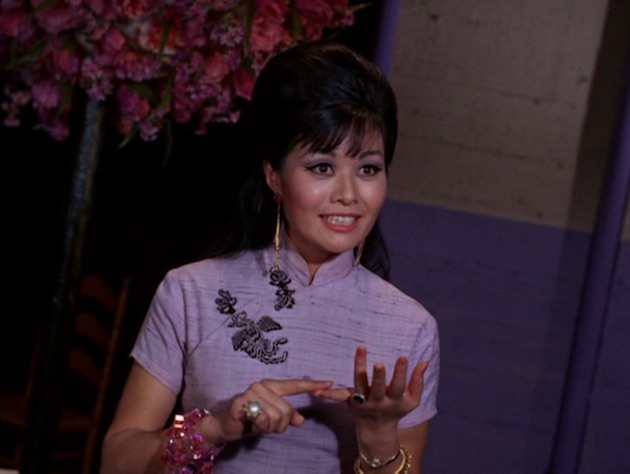
Gordon, lost as usual without the Dynamic Duo, decides to put together a highlight reel of some of their exploits because—well, honestly, it’s totally unclear why they’re watching this highlight reel, though it’s all stuff that could not possibly have been filmed. (Hilariously, none of it is from “Death in Slow Motion”/“The Riddler’s False Notion” or from “Penguin is a Girl’s Best Friend”/“Penguin Sets a Trend”/“Penguin’s Disastrous End,” all episodes in which Batman and Robin were actually put on film as part of the plot…)
Alfred speaks to the press about the kidnapping, then is paid a visit by Barbara, who says that Louie the Lilac kidnapped Bruce and Dick. Her being a witness to the kidnapping is apparently not a good enough reason for her to tell her father that, since he apparently won’t trust her eyewitness account. (Nor that of Dick’s friends.) She gets Alfred to promise to let her know if he gets any leads, and when he gets Louie’s likely HQ from the Bat-computer, he passes it on to Barbara.
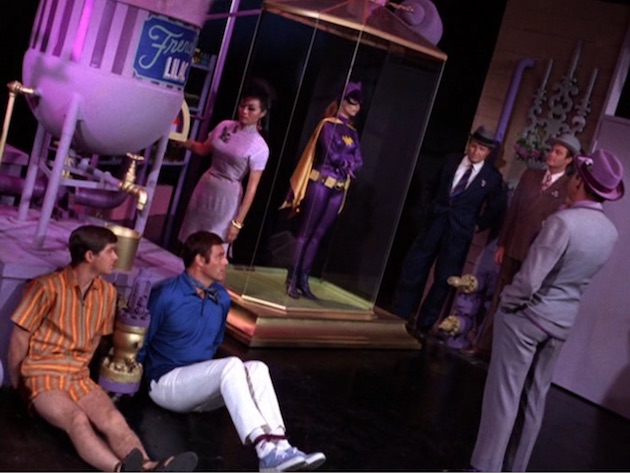
After dealing with a snooping maintenance man, Batgirl heads to Louie’s hideout, where she’s met by Gordon, O’Hara, a bunch of cops, and also the empty Batmobile (sent there by Alfred via remote control). The cops have the place surrounded—and then they stand around, since they figure Batman and Robin are inside. (They’re sorta right.) Batgirl goes in on her own, but Louie takes her out in half a second. Louie puts Batgirl in a macerating vat, which finally convinces Bruce to perform the operations on the animals in exchange for her life. Bruce asks only for two glasses of warm water.
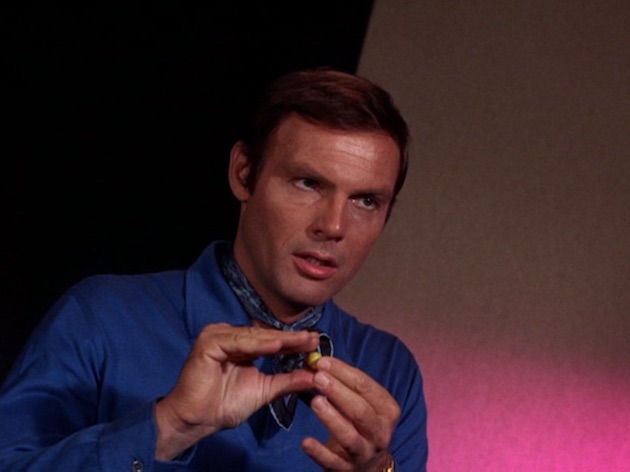
Bruce and Dick are locked in the basement with the two glasses of warm water, at which point Bruce takes two pills out of his ascot, which unfold into their costumes in the water. They break out of the basement just in time to keep Batgirl from being boiled in oil (since Louie had no intention of keeping his part of the bargain, being evil and all). Fisticuffs ensue, and our heroes are triumphant. Batgirl goes to get the cops from outside, allowing Bruce and Dick to change clothes. They say that the Dynamic Duo continued onward, and Alfred remote drove the Batmobile away to make it convincing.
Gordon is exhausted from all that standing around outside, and tells Bruce, Dick, and O’Hara that he’s taking a vacation—but Bruce informs him that there will be a civic dinner in his honor next week, which was supposed to be a surprise. But the real surprise will be Nora Clavicle…
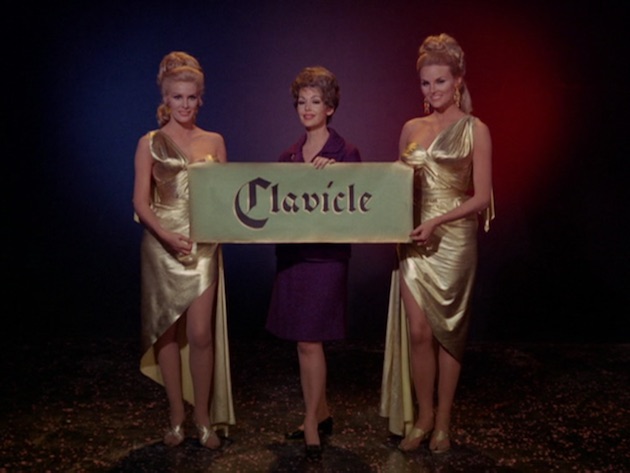
Fetch the Bat-shark-repellant! Bruce has a two-way wrist radio on his watch—just like Dick Tracy! The Batmobile once again travels through Gotham via remote control. Bruce has recently perfected quick-unfolding costumes, complete with fully stocked utility belts, that unfold in warm water, thus allowing our heroes to make a quick change and save the day. The belts include a bat-laser and a bat-grappling hook.
Meanwhile, Barbara has a secret Batgirl room instant transformer (handily labelled “SECRET BATGIRL ROOM INSTANT TRANSFORMER”), which disguises her Batgirl closet as a normal storage room, er, somehow. And next to it is the secret Batgirl room instant re-transformer (similarly handily labelled), which restores it to its usual crimefighter’s closet. She also has a Batgirl vat-opener in case some day she was imprisoned in a vat—which, to be fair, was always a likely occurrence once she decided to get into the costumed crimefighting biz.
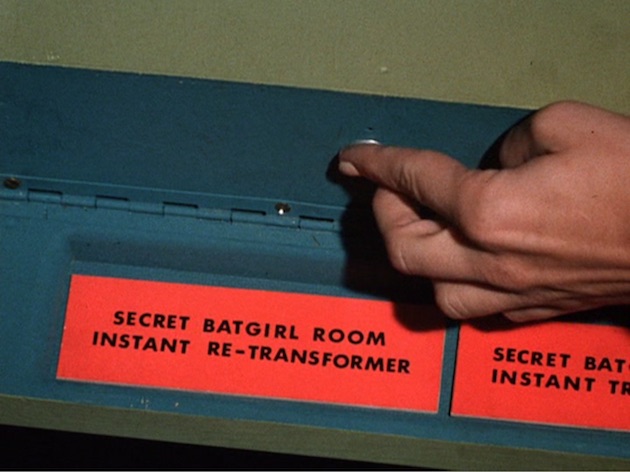
Holy #@!%$, Batman! “Holy finishing touches!” is the best Robin can do when they put their quick-unfolding uniforms on.
Gotham City’s finest. Apparently, Barbara thinks so highly of her father that she is convinced that if she told him about a kidnapping that she and several other people witnessed, he would dismiss it.
Then again, their solution to a hostage crisis is to stand around and wait for Batman to tell them what to do, so perhaps Barbara is right to take matters into her own hands…
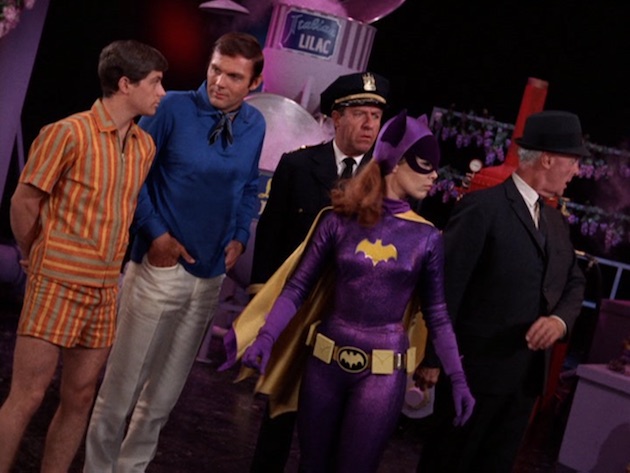
To be fair, they do manage to figure out Louie’s hideout on their own, which is a pretty impressive accomplishment for the GCPD…
Special Guest Villain. Milton Berle returns, following “Louie, the Lilac.” It’s not clear why this villain, in particular, deserved a return engagement when, for example, Joan Collins—who was way more interesting—didn’t, but such are the vicissitudes of life.
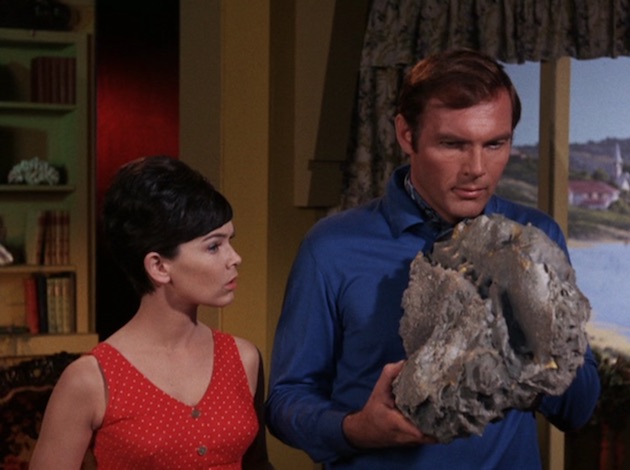
Na-na na-na na-na na-na na.
“You mean the stuff given forth by whales from which they make perfume?”
—Dick’s hugely awkward reply to Bruce’s mention of ambergris that cleverly avoids calling it whale vomit.
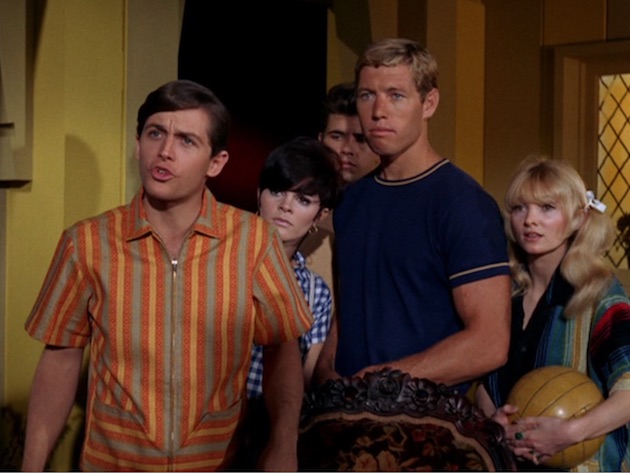
No sex, please, we’re superheroes. At the Wayne beach house, Bruce is wearing an apache (a variation on an ascot), Dick is wearing an orange shirt that could be used to signal ships in fog, along with shorts and moccasins, while Barbara is wearing a very hip and sexy red number. The three faces of 1968 sex appeal, ladies and gentlemen…
Trivial matters: This episode was discussed on The Batcave Podcast episode 61 by host John S. Drew with special guest chum, Joseph Culp, a.k.a. “Captain Scotland,” host of The Highlander’s Heart podcast.
Nobu McCarthy, the former Miss Tokyo and a character actor who often played Asian roles, plays Lotus, Louie’s moll. Former child star turned character actor Percy Helton plays the janitor.
While Madge Blake does not appear in the episode, Harriet is mentioned.
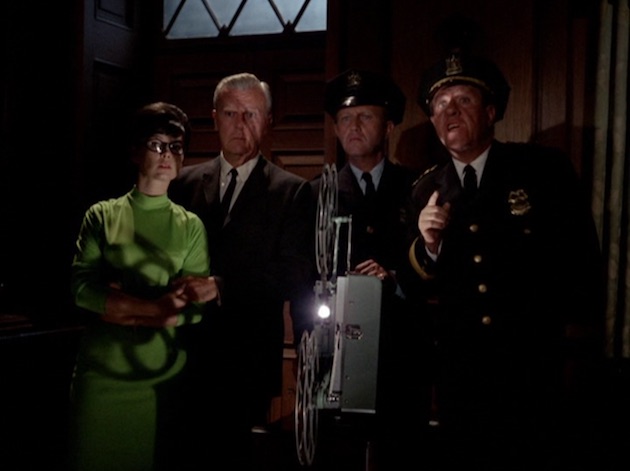
The reel Gordon’s detectives put together of Batman and Robin’s exploits include scenes from “Come Back Shame”/“It’s How You Play the Game,” “Green Ice”/“Deep Freeze” (WILD!), “The Curse of Tut”/“The Pharaoh’s in a Rut,” and “The Zodiac Crimes”/“The Joker’s Hard Times”/“The Penguin Declines.”
Pow! Biff! Zowie! “Those muskrats and muskdeer sure are musky.” The most somnabulent performance by a villain since Art Carney mumbled his way through “Shoot a Crooked Arrow”/“Walk the Straight and Narrow,” Milton Berle is practically checking his watch to see if it’s time for him to go home yet—or better yet, to the local bar—as he can barely be arsed to inflect the words he speaks. He doesn’t even have the swagger that he had in “Louie, the Lilac,” he’s just reading his lines as worst he possibly can.
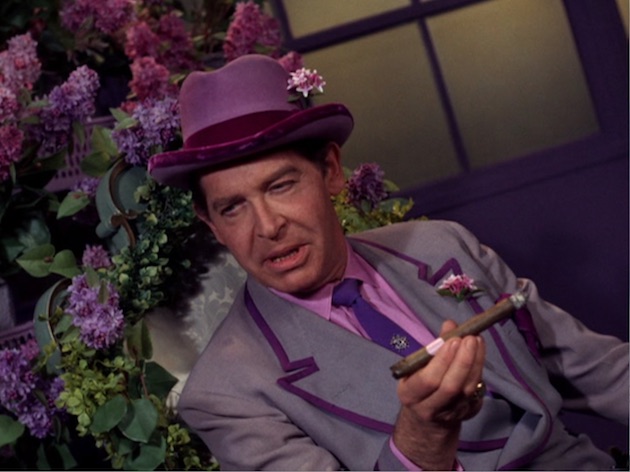
On top of that, the episode is almost entirely filler. Barbara visiting Wayne Manor to talk to Alfred is a pointless scene—they could’ve just had Alfred call Barbara with the info from the Bat-computer—the highlight reel of (much better) past episodes serves no plot function whatsoever except to fill time, and the bit with Barbara and the maintenance guy is not only pointless, it’s patently absurd (this is the first time a bat-device has actively violated laws of physics, I think) and concludes with one of our heroes threatening the maintenance guy with gun violence if he invades her home again. Yeah. Any one of these things would be obvious filler, but three such scenes in a half-hour episode?
Of course, the actual plot calls for the kidnapping of several animals, the wrangling of which is so not in the budget. They’re, of course, unseen in the basement, and the producers can’t even be bothered to loop in some animal sounds, because, y’know, that would be an effort. And it’s pretty obvious that everybody’s given up on effort in this episode.
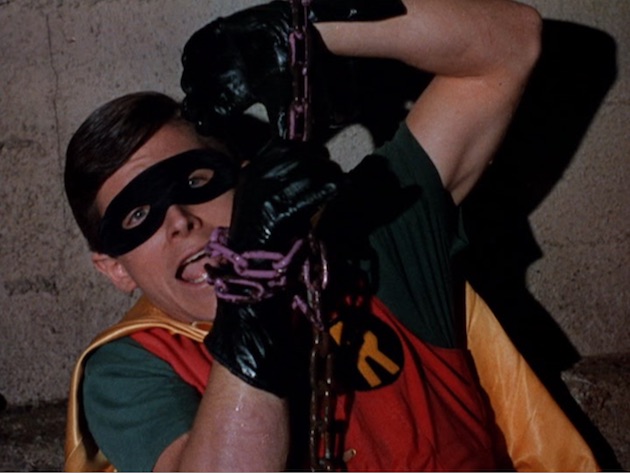
Bat-rating: 1
Keith R.A. DeCandido recently announced one of his niftiest new projects, which will be out this summer: Orphan Black: Classified Clone Report—From the Files of Dr. Delphine Cormier. This reference work is the ultimate companion to the BBC America TV series, and will be released alongside the airing of the show’s fifth and final season. More information on Keith’s blog.










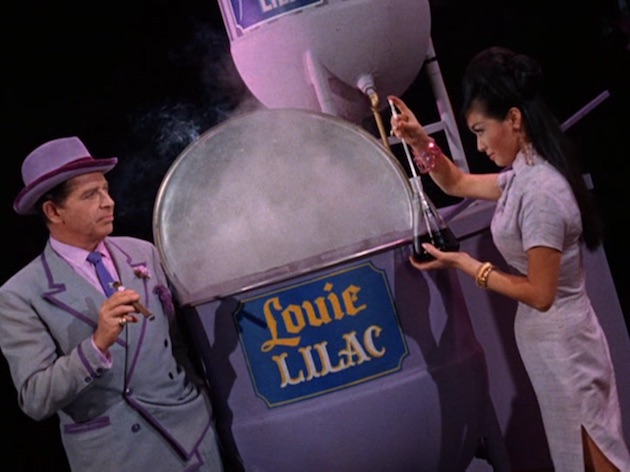
Well, props to the show for at least avoiding yellowface? (I think Lotus is the only ’66 character who’s Asian, authentic or otherwise – there’s quite a few uncomfortable stereotypes around her, but it could’ve been way worse.)
I’ll also speak up for the Instant Batsuit pills – they’re a delightful bit of comic-book kookiness (I believe several modern writers have come up with similar explanations for where Clark Kent keeps his costume), and in a lot of ways they’re the handiest quick-change explanation for Batman & Robin. The comics’ go-to of stashing spare costumes in briefcases, or in hidden nooks & crannies around the workplace, just raises more questions than it answers…
Otherwise – dear Lord, you could market this thing as an insomnia cure. But don’t despair just yet, Bat-fans… the worst is yet to come.
Man, this was awful. Milton Berle is still phoning in the part of Louie, and he’s such an uninteresting villain — a gangster obsessed with flowers and perfume? And the whole scent-gland thing was kind of icky and weird. And what was with the mini-clip show of the cops watching home movies of Batman and Robin’s deathtrap escapes? Where the hell did they get that footage???? And what’s with Barbara telling Alfred she “strongly suspected” Louie of the kidnapping when she was actually there when it happened? She seriously didn’t tell her father that she’d witnessed the kidnapping?
And then they set up what looks like a Batgirl solo adventure, then totally squander it by having Louie take her down effortlessly and reduce her to damsel mode again — something that happened far too often in the back half of the season. Really disappointing. Although it was nice to get some exposition about where her secret room came from, with a little help from Percy Helton. And the Bat-costumes in pill form, complete with utility belts, were a nice comic-booky touch.
And now the teaser for next week actually has the villainess responding to the narrator and addressing the audience. Plus it’s a preview for what’s probably the most sexist episode of the whole series. Brace yourselves, Bat-fans.
Oh, and that should be “macerating vat,” referring to a stage in the perfume manufacturing process in which flowers are steeped in hot fats to extract their fragrant oils. So basically they were planning to deep-fry Batgirl, rather than turning her into a Maserati.
@1/rubberlotus: There was at least one more Asian performer in Batman, Bebe Louie as the novelty shop clerk in “Batman Sets the Pace.” Probably also one of the United World delegates in the movie.
Christopher: “maserating” was a typo borne of my left hand automatically typing an “s” after typing “ma.” Thanks for catching it– it’s fixed.
—Keith R.A. DeCandido
In terms of worst Batman episode ever, this one is right up there. There are other bad ones (the next one in airing order comes to mind) that could have been made at least halfway decent with a massive rewrite. In this episode, there’s almost nothing there to rewrite. As Keith said, there are three major filler scenes. I guess they not only were trying to kill time, but distract viewers from the lack of a coherent plot. And of course the old deathtrap footage begs the question of why didn’t the camera operator help Batman and Robin, or was that person employed by the villains?
Great point, Keith, about Joan Collins’ Siren being much more worthy of a return appearance. I’m often critical of guest villains who chew the scenery too much, but at least that takes some effort, as opposed to Berle flatlining his way through this ep.
Why Barbara withheld information from her father is beyond me, and it doesn’t make the character come off well. It’s unfortunate there wasn’t a female writer working on the show–I think Barbara/Batgirl would have been written better in that case.
I’m not a fan of the instant unfolding Bat-costumes. I see it as just another of Charles Hoffman’s many deus ex machinas. But I am surprised the box of Easter egg dye didn’t break the season 3 budget.
One of the few highlights of this episode: Bruce tellng Dick the costume pills are the latest invention of Batman’s, as opposed to “mine.” All those years before The Dark Knight Returns, it’s a suggestion that he does indeed consider his alter ego a separate personality on some level.
@5/Steve: I think it’s reading too much into it to see it as a sign of a dual personality. It was always the conceit of this show, and largely of the comics at the time, to always refer to them as Bruce and Dick in civvies and as Batman and Robin in costume. The show took that conceit to a rigorous extreme as part of its approach to humor, i.e. to play all the tropes of the comic with such exaggerated literalness that they became farcical. I mentioned in a recent Rewatch how the episode made a mistake by having Alfred call Dick “Master Robin” when he was out of costume. That was breaking the rules the show otherwise adhered to religiously. It wasn’t that they had different personalities; Bruce and Dick usually behaved exactly the same as Batman and Robin. It was just their inflexible habit to go by different names in costume than they did out of costume.
Don’t forget Kato from the Green Hornet crossover. The unfolding costume was standard Silver Age fare. Filmation used a variation the the Flash shorts where Barry Allen and Wally West had their costumes hidden in a secret compartment on a ring. Deep fried Batgirl sounds more like a King Tut death trap (Tut has used boiling oil in the past). In fact, the entire episode could have been written for King Tut with him attempting to recreate an ancient Egyptian fragrance to find a consort.
They all need to be careful with that Ambergris stuff. It turns you into a water breather. Oops, wrong rewatch!
@7/Charles: The Flash costumes being hidden in rings comes from the comics; it’s not specific to the Filmation show. It was referenced in the first season of the current Flash series, where the Reverse Flash had his costume in a ring (and Cisco geeked out over it and wanted to figure out how to replicate it for Barry, an idea the show has surprisingly failed to follow up on).
Christopher Bennett, I used the Filmation shorts as it’s the reference I’m most familiar with. I don’t doubt its use in the comics but the Silver Age Flash was before my time.
Louie’s moll Lotus is thrilled at the ambergris, but she still needs glands and follicles and scent pouches from deer, beavers, civet cats, and muskrats. Louie—who sounds almost bored by the whole concept of cornering the market on perfume, soap, and cosmetics—sends his boys out to get the animals. Bruce—a famous sportsman and animal expert—will extract the needed body bits.
I realize it’s not even a top 10 problem in this episode, but surely it’s more efficient to just commit some caper that will lead to cash, then buy that sort of thing on the open market. Given how popular hunting is/was in America, it wouldn’t even be that hard to contract this out. Most previous episodes, at least, had the villains plotting to either get money, some one of a kind artifact not available on the open market, or something valuable that fits in with their schtick.
I wonder, would the Louie the Lilac episodes have been any better if they’d used Poison Ivy instead? She’s a flower-themed villain, sort of, and it would’ve seemed less incongruous for her to be interested in crime based on perfumes and cosmetics (given the ’60s comic-book Ivy’s fondness for love-potion lipstick and other weapons based on beauty and hair products) than for an aging tough-guy gangster to do so. Ditto with the first Louie episode and its premise of controlling flower children. And having someone like Ann-Margret, say, vamping it up in the role would’ve been a great improvement on Milton Berle sleepwalking to a paycheck.
@6/Chris: I think what you’re describing is Bruce, dick and Alfred addressing each other. What makes this different in my mind is that it’s a case of one of them referring to himself in the third person. For example,I can’t recall any instance of Dick Grayson name checking Robin the Boy Wonder when there wasn’t some civilian around he was trying to throw off. It’s just fascinating to hear Bruce talk about the exploits of “Batman” when Dick is his only audience — especially as there’s no real reason for him to do it. One could theorize that he’s merely trying to protect his secret identity in case anyone is listening in; but that hypothesis doesn’t really hold water, since the very subject of their conversation would give the game away. No, in this instance at least, Bruce appears to regard Batman as a personna independent enough to be referred to in the third person. As far as I can recall, that’s an anomaly within the series, and thus certainly interesting enough to warrant mention.
@13/Steve: Yes, it’s a bit anomalous, but it doesn’t mean there was any attempt being made to suggest some serious psychological complexity about dual personalities or whatever. That’s back-projecting an anachronistic notion, filtering it through our modern experience of Batman. Nobody writing about Batman at the time would’ve ever contemplated such a thing. It wasn’t about the dark tormented soul of Bruce Wayne, it was about taking a running gag in a TV sitcom to its absurd conclusion.
Or maybe not so absurd. Remember the two basic conceits: One, that the Duo are never out of costume in the Batcave; and two, that they’re always addressed as Batman and Robin while in costume. Bruce was talking about the expanding costume pills he’d invented, and clearly those are things he would’ve worked on in the Batcave instead of in Stately Wayne Manor. Even with Aunt Harriet no longer around regularly, he probably wouldn’t want to work openly on Bat-equipment up in the Manor where visitors might drop by, and of course he has more equipment to work with in the cave. So the costume pills are something he would’ve developed while in the cave, and thus while in costume and going by the name Batman. Thus, when Bruce spoke of his work developing them, he referred to himself as Batman, because that was the mode he had been in at the time. Not because he had a psychological condition, but because it was the rigid external logic of how the show’s universe operated.
@14/ Chris: I didn’t say anything about darkness or torment, though I can certainly see why raising the name of The Dark Knight Returns might call up those associations. But even under the practical parameters you describe — and which I absolutely recognize and agree with — it isn’t hard to put the practice of referring to one’s alter ego in the 3rd person squarely in line with a split personality the character would LATER be envisioned to harbor. Put it this way: if you were writing a sequel to the Lego Batman Movie, you wouldn’t have to work very hard to come up with a joke about the first sign of mental illness being the devising of a separate name you call yourself when you’re wearing a different set of clothes.
Christopher: I have long felt that Ann Margret should have played Poison Ivy on the series and left Milton Berle to wither on the vine, as it were. Would have looked damned fetching in the costume as well.
@15/Steve: “…it isn’t hard to put the practice of referring to one’s alter ego in the 3rd person squarely in line with a split personality the character would LATER be envisioned to harbor.”
Yeah, but having been a history major in college, I resist that kind of back-projecting, because it’s one of the major fallacies that befalls people studying the past. It’s important to be able to differentiate between the intentions of people at the time and the assumptions that a modern observer superimposes. Once you start talking about how something from an older work can potentially be reintepreted through modern attitudes, it’s inevitable that some people in your audience will mistake that for a claim that it was actually intended that way to begin with. And that can lead to all sorts of fallacious memes getting out there.
Plus, as a Batman ’66 fan, I’m not interested in contaminating it with later interpretations of the character. It was its own entity and I appreciate it as an artifact of its time, a reflection of an earlier, purer era in the history of Batman.
Also, any interpretation of the modern Bruce Wayne/Batman being mentally ill is a corruption and denigration of the character. He’s driven by past traumas, yes, but he’s found a very functional and constructive way of coping with those traumas, which means that his behavior does not meet the diagnostic criteria for mental illness. He’s completely in touch with the reality around him — in fact, he perceives it far more clearly than most — and he’s able to accomplish the tasks he sets for himself with extraordinary competence and success. He’s completely rational and has found a coping method that works for him, and that lets him save many other lives in the process. He’s not insane, just eccentric. Dissociative identity disorder is a psychopathology that makes a person unable to function effectively. That’s not Batman.
When people say that Batman and Bruce Wayne are different people, they’re talking about the roles that the man plays by choice. The real Bruce Wayne is a driven, dedicated crimefighter, who wears a costume and calls himself Batman because it’s useful for his purposes. He consciously adopts the public facade of Bruce Wayne as a feckless billionaire playboy to throw off suspicion. If he talks about the roles he plays as two different people, that’s no different from an actor talking about oneself and one’s character as different people, as actors sometimes do. Immersing oneself in a role is not the same as having a dissociative break.
@17/Chris:
“Once you start talking about how something from an older work canpotentially be reintepreted through modern attitudes, it’s inevitable that some people in your audience will mistake that for a claim that it was actually intended that way to begin with. And that can lead to all sorts of fallacious memes getting out there.”
You mean like by saying that Janice Lester wasn’t really asserting that women couldn’t be Starship captains? Hey, you’ve convinced me! ;)
@12 and 16: Agreed about Poison Ivy being a much more natural fit (no pun) for the episode then this very odd character. Apparently we weren’t the only ones sharing this opinion. In the Batman ’66 comic, a series based in the continuity and universe of the show, Poison Ivy is introduced and the first thing she does is promptly dispose off Louie the Lilac to show who is Gotham’s one true plant/flower themed villain.
@19/V: I read that comic story, and it’s where I got the idea of substituting Ivy for Louie.
I’m wondering if you’re British, because the only way I can see for “fit” to be a pun here is in the British slang sense of “sexually attractive.”
I was actually thinking the pun was “natural”.
MaGnUs is correct, Christopher, the pun is “natural.”
—Keith R.A. DeCandido
As much as I adore the idea of Ann-Margaret as Poison Ivy – I just watched 1966’s Murderers’ Row, and she would have been perfect!! – they didn’t introduce the plant shtick for many years in the comics. She called herself Poison Ivy because she’s like an itch you can’t scratch. In fact, if the show’s producers *had* “corrupted” Poison Ivy by making her obsessed with plants and flowers, comic fans who spent so many years upset with this program would probably have added that to the list of the show’s sins.
@23/Grant Goggans: In her original appearance, Ivy did use a plant-derived lipstick to hypnotize men. She also used beauty and hair products as weapons, and as I mentioned, this episode is more about perfume than about plants (since Louie is focused mainly on ambergris and mammalian scent glands, ick). As for the first Louie episode, it wasn’t really about plants as much as about “flower power,” the symbolism of the hippie movement, and the villain’s desire to gain control over that movement. The early Ivy dressed in a leaf-styled costume, so that superficial symbolism was there, and she was all about controlling people. So I still say the plots of both these episodes could’ve worked for the Ivy character as she existed at the time — at least as well as they worked for Louie, anyway.
The main problem is that early Ivy was in the same vein as characters like Marcia and Siren — sexy villainesses defined primarily by their seductive allure and pursuit of men, especially Batman. So it’s hard to imagine the producers adapting Ivy without using a plot involving the seduction of Batman.
Ah, the role reversal episode with Batgirl getting more screen time than the title character. This was a different kind of romp. Not a great one either.
Spot on about the clip show scene. What were escapes supposed to teach anyway? There’s more to B&R’s efforts than that.
I imagine if Barbara had revealed she was a witness, she would be tied up with statements and the like and couldn’t be in two places at once. Who knows what else would have happened to Bruce and Dick if she hadn’t intervened. Batgirl being a prisoner was Bruce’s bargaining chip to pull the instant unfolding costume trick.
Actually, Gordon is wrong to say that that scene had anything to do with King Tut. It’s clearly the mined-road scene from “Better Luck Next Time” with Catwoman. Of course, they sometimes recycled footage (as with the self-driving Batmobile in the rain, from Penguin/Marsha part two, in this very Louie episode), but I skimmed through the Tut episodes Keith mentioned and that footage doesn’t appear there.
Here’s a little tidbit I noticed after repeated viewings: One of the recurring background cops now has a full name. The man running the projector, whom Gordon calls “Jim,” is the same cop who was addressed as Goldberg in “Marsha, Queen of Diamonds.” So it would appear his name is “Jim Goldberg.” The actor, Bill Dyer, also appears as a cop (presumably Goldberg) in “Catwoman Goes to College” and plays the bailiff in “The Joke’s on Catwoman” and the chef in “The Thirteenth Hat.”